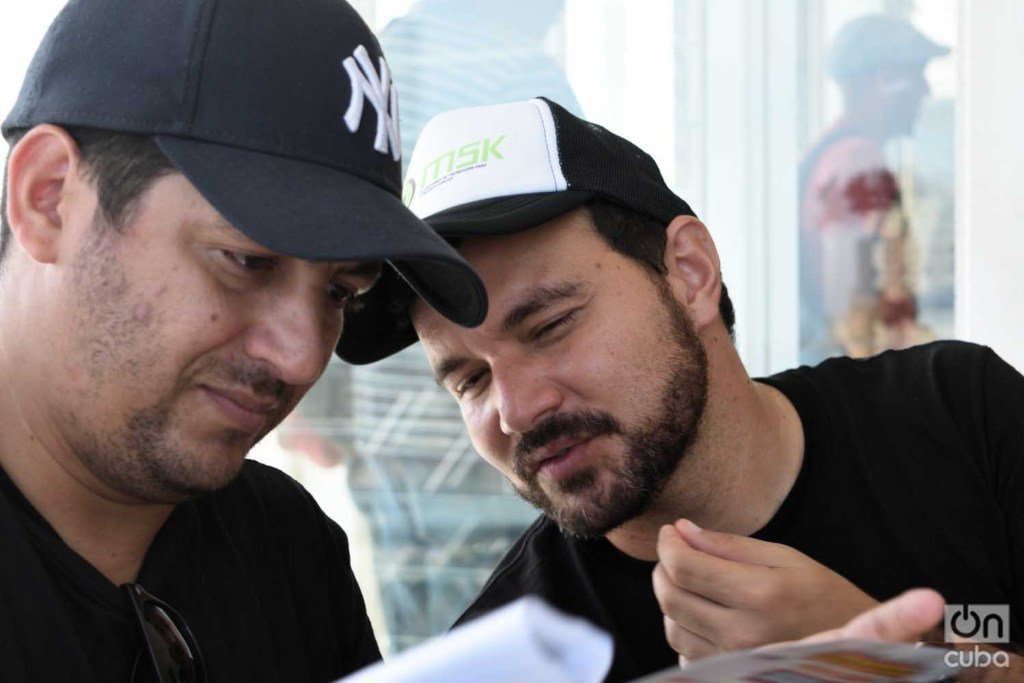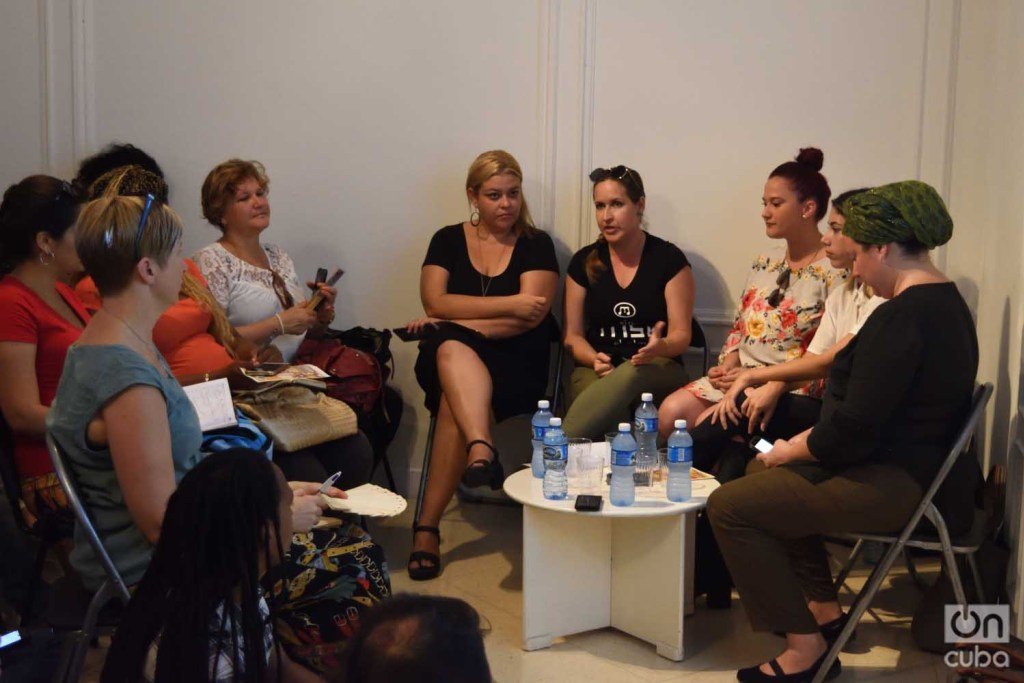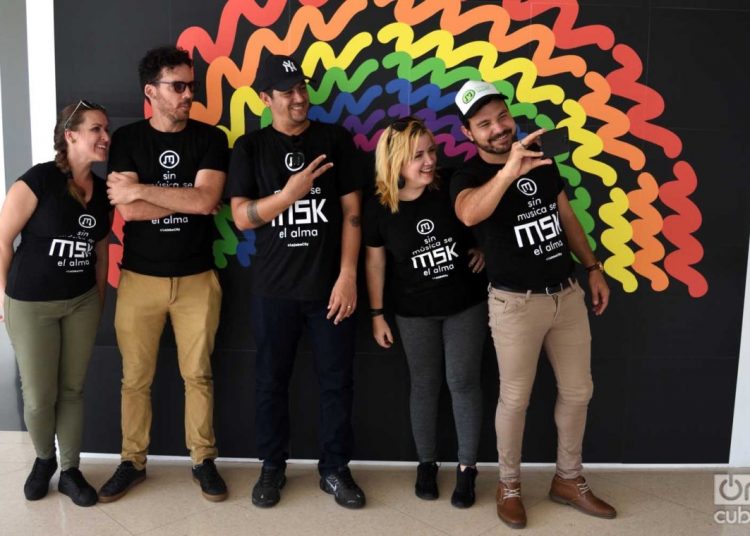The catalog of MSK, an undertaking dedicated to the promotion of Cuban music in the digital sphere, includes from son musician Manolito Simonet to the Cimafunk phenomenon, from jazzman Alejandro Falcón to the Conga de Los Hoyos, from singer-songwriter Luis Franco to the Golpe Seko rappers.
When it began just six months ago it had only three names in its catalog; today it has around 40. And not only from Havana; also from Matanzas, Villa Clara, Santiago de Cuba, Pinar del Río. And even from outside the island.
“The goal is to promote good Cuban music, wherever it comes from and regardless of the genre,” explains to OnCuba Gilberto Grave de Peralta, a computer scientist and project director, who, along with his wife, the designer and musician Mirsa Martínez, had a previous experience in artistic marketing with the now extinct Habana2Go magazine.
MSK was born with this and other antecedents, but with a more comprehensive and ambitious idea; an enterprise for which they had been preparing more than half a year until its launch last December 13.

It hasn’t been an easy road, but it’s very comforting, according to its members, only six and coming from diverse professional fields, although with music as a common denominator. They are Gilberto and Mirsa―in charge of visualizing the project―, with musicologist Gretel Garlobo, journalist Michel Hernández, and computer scientists Ernesto Redonet and Dayron Avello, the latter in charge of social networks, MSK’s main showcase in its still short life, together with its web, currently under reconstruction.
“We want to become a Cuban music benchmark,” says Gretel, “so that people who want to know what type of music there is in Cuba and which artists are doing it can visit us.”
“Cuban music is very diverse and there aren’t many spaces to coherently promote that diversity. For the majority there is only the Buena Vista Social Club, salsa and now reggaeton. That is a deficit we have on a global scale. The way we position ourselves as a benchmark precisely stems from the fact that the genre or if it is a new or consecrated artist doesn’t matter for MSK,” explains the young musicologist.
To achieve this, this private enterprise walks in a double direction: on the one hand, that of the artists, who are its clients and beneficiaries, and, on the other, that of the audiences, their public―the real and the potential―who surf Internet and for whom it aspires to deliver an offline application in the coming months.
For the former, their services range from free membership in the catalog to specialized communication and analysis campaigns of their presence on social networks, following more economic or more expensive and integrating packages. The client, the musician, decides.
In addition, they also promote musical events in the digital ecosystem, something that they have already done with good results with the Potaje Urbano hip hop festivals, held in the Matanzas city of Colón, and Habana Ciudad Electrónica, in the Cuban capital, and which they hope to continue.
https://www.facebook.com/mskcuba/posts/292902791625436?__xts__[0]=68.ARCo1_1IrSXAEx3_ZQ5AEt8FG7gMkJT7CZZhyCbhY3z3k1Diu-Zi7Nm9mPEKuA1eL8qBI5LWR4OFlw91_bbeyw4xXBkFM8J904PA8vt8a-3GLO1krQ2y2SPOun0ydHM7jqJwYV6tb4v9bYCgRsmZHDW4I8vT5rOBipQKnTz_NtONBoSsfhrz2srwjBDncO_Em18fPUkr_-Uwzm6QB2uOrkOZUyRFVzLfR6tSlBaoh-0HnEr9_SOaHTtDu3tnDs9SP4-fh0Fe3wuenXi66zNg7Jj1Nu5Iqi3vZB4z1XB8sK5BHVHv-dSESGJOPAqqEqsN37gmNhv_SYLd3Mul44ja6lI&__tn__=-R
As for the public, the work focuses on networks, the creation of a community of followers―currently on Facebook they exceed 2,500― “to ensure that musicians have a potential audience when they enter the catalog,” explains Gilberto.
The equation is directly proportional and consistent: the more followers they have, the more musicians could be interested in their services, and these, in turn, attract more audiences. For this, they rely on a systematic and coordinated work that appeals to various tools.
“It is not about publishing for the sake of publishing,” says Dayron, “but to intentionally promote Cuban music across its broad spectrum, the same through news and promotions as such, as well as through phrases, questions and contests that seek to highlight Cubanness, or even memes, because humor is always important. And we also take advantage of Cuba’s rich musical heritage, which allows us to remember legendary figures or important dates, something that up to now has been very well received and contributes to the education of the public. In fact, our post with the greatest reach was on Benny Moré.”
To be and being present
MSK emerged in a favorable context: the increase in connectivity and the use of social networks on the island. Just days before its launch, the mobile Internet connection on cell phones began officially in Cuba, something that has triggered Cubans’ access to the global web.
This scenario, however, is still untapped by many musicians. And although a priori it represents an opportunity for a project like MSK, it is not something that happens from one day to the other.
“Investing in promotion is as important as investing in a good instrument,” says Gretel, who confirms how difficult it can be to convince some artists, even those already established, to promote themselves on the networks.
“They think that because their music is played on the radio or because they recorded a TV show like 23 y M, they are promoting themselves well. And they don’t realize that the scenario has changed,” she complains.
“There are others,” she continues, “who have been inserting themselves on the Internet, but that is not enough either. The fact that you have an instrument doesn’t mean you know how to play it, and the same thing happens with networks. Having access to them on your cell phone doesn’t necessarily mean you know how to use them. That’s why our work is also about education, about making musicians aware of that.”
https://www.facebook.com/mskcuba/photos/a.210321463216903/338388910410157/?type=3
Given the reluctance, the answer “is the application of a scientific method for promoting, publicizing and strengthening their identity in the digital space,” says Gilberto, who argues that the fact that “whether the artists are consecrated or have a sustained work on social networks doesn’t mean they can’t have a space in MSK.”
“We have different modules and services, and what we want is for each artist to create their own plans,” he says. “The best thing is that we adapt to each circumstance: if they are famous musicians, who are established in the media and have a page with thousands of followers, we can analyze their audience, the effectiveness of their messages, and in that way help them evaluate in what state they already are and strategically define future works, tours and disc releases where they have a larger audience.”
“And if they’re new artists, or with little or no experience on the networks, then we can apply a more complete strategy, with a design of their image, of the messages, with a follow-up of their presentation calendar. We have options for everybody,” he adds.
However, at least in a first stage they didn’t close the door to the free incorporations to their catalog, “as a way to help the less promoted and also because we were interested in growing in number of artists,” explains Gretel.
This has forced them carry out an arduous job of selection, because of the many requests received, both by Facebook and WhatsApp―where they have groups―, as well as by email and even face to face. Quality has been the standard.
“We have been very careful,” says Gilberto, “because it is not only the musician but also the prestige of MSK. We seek to propose to the audience artists with a certain quality standard, and if they don’t have it, it is a loss for the project, for what we have achieved in these six months. And that at the same time could affect the non-incorporation of other artists. That’s why we study their work, their projection on social networks, with no rush.”
However, they aspire to take a leap to another level. And with them, the artists.
“Being in the catalog guarantees that people see you, and for now it’s free,” says Dayron, “but to the extent that we start growing, that the traffic we have already gained on the networks increases and the web is strengthened, it’s going to be more beneficial for the artist to be in the catalog. And that will also demand a cost. In addition, we intend to show more than basic information, also videos, music, and that entails a more creative and differentiated work.”

Doing away with “the clans,” looking toward the future
For MSK there are no distinctions in music, as long as it is good, but reality follows its own course. That’s why, in its still young catalog, some genres predominate over others, a correlation that its team seeks to change.
For the time being and contrary to what one might think, the so-called “alternative music”―electronic, rock, hip hop, fusion―establishes the guidelines over more commercial trends. But they are not closed to any genre, even to the controversial reggaeton, “as long as quality is not violated,” Gretel specifies.
Neither do they sit down to wait for all the requests, where, they confirm, young and alternative artists predominate, more connected to the digital universe and in need of promotion.
“To legitimize our catalog we also address artists we like and are interested in having in our catalog, because it seems important to include both well-known musicians and newcomers,” says the musicologist, who advances that they have “pending conversations with top-level figures” who they prefer not to reveal for the time being.
However, beyond genres and levels of recognition, MSK members see their project as a platform to expand the preferences of their followers and diversify musical taste.
“One of the things we want to achieve is to do away with ‘the clans’ that exist in Cuban music, to give people the opportunity to get to know other music and not remain in a closed consumption,” explains Gilberto.
“We would like to contribute so that those who follow rock, or urban music, or jazz, or salsa, can consume the contents of other genres through quality proposals and interact with them. Although without invasions or straitjackets, but with suggestive, intentional posts. And if in the end they decide not to do it, we can then offer them a filter to receive news or content only from certain artists or genres of their choice.”
Another aspect that interests them is the relationship with institutions, in particular those linked to music, something that until now they haven’t had any difficulties with “because we work without violating anything that’s legal and knowing the margins we have to operate in accordance with self-employment licenses,” explains Gretel.
Thus, they have worked in festivals such as Potaje Urbano and Habana Ciudad Electrónica and formed part of panels at events such as AM-PM, in which they shared their experiences in digital marketing with other independent projects and also state-run record labels. But they are aiming for more.

“We want to approach the institutions because they are the ones that work directly with many artists, through record labels, agencies, which can’t carry the entire projection of the musician for different reasons and we offer a specialized service in a specific scenario: the digital. We are a solution for that, according to the contracting possibilities of each of these enterprises,” Gilberto argues.
Other projections also point far.
“We are in the process of alliances with audiovisual producers to provide a more complete service to our customers and we also want to do workshops with musicians to carry out a better work on the networks, because that will benefit their career and Cuban music in general,” advances the director of MSK.
They even dream of being able to accompany artists from when they are born and contributing to their consolidation. But meanwhile, they continue forward, step by step, “touching everything with the hand,” appealing to collective work and adapting to each scenario.
“We have many plans, such as the mobile application we are working on, and we analyze everything we do,” concludes Gilberto. “We meet, coordinate and rethink whatever is necessary, but without renouncing our objectives. The important thing is to keep moving forward and not backtracking on what has already been gained. For us and also for Cuban music.”










